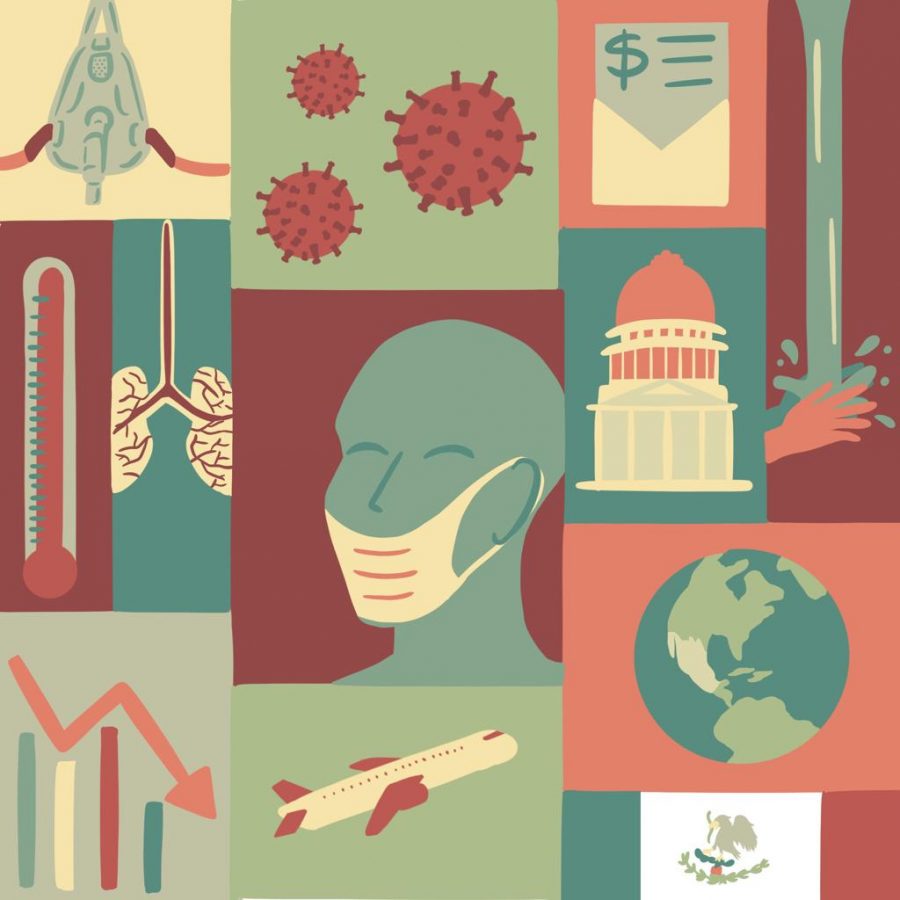Mexican government fails to respond to COVID-19
Athmika Sriram
Among the many measures that dozens of nations have been taking to control COVID-19, Mexico has failed to execute many of them.
May 3, 2020
Mexican President Andrés Manuel López Obrador has hesitated to acknowledge the extent of the COVID-19 crisis and has been late to take action, justifying his decisions by stating that locking Mexico down would lead to an economic recession.
Unlike other countries, Mexico still permits air travel and allows in foreigners and visitors. President Obrador has not canceled rallies or political gatherings either, and he continues to make physical contact with supporters in crowded settings.
Recent predictions by the Bank of America have shown that the Mexican economy could contract by as much as 8% in 2020, which would be the first time the country experienced two consecutive years of economic contraction since the 1930s. Moreover, the Centro de Estudios Espinosa Yglesias, an institute that researches and advocates for policies and promotes social mobility in Mexico, predicted that the COVID-19 pandemic could raise the poverty line to include 57% of the population, pushing another 21 million Mexicans into poverty.
A vegetable vendor in North Mexico City stated that she was unable to stop working because the government hasn’t provided any other means for them to earn money. Another resident in the city added that the threat of the virus isn’t as harmful as it seems.
“If this virus were so dangerous,” he stated, “I think they would have already closed the metro.”
Mexico experienced multiple economic shocks at the beginning of 2019, which means further business closures this year could result in a deeper recession for the country. Mexico’s economy, especially the lower end of the socioeconomic scale, mainly relies on manufacturing, oil production and tourism, all of which would be affected by a lockdown.
With 22,088 confirmed cases and 2,061 deaths as of 10:32:29 a.m. today (Johns Hopkins University CSSE), Mexico has not been hit hard by the pandemic relative to countries such as the U.S. or China. However, these numbers do not accurately reflect the prevalence of the virus in the country: Mexico had performed 11,000 tests by the end of April, of which around 10,000 were confirmed positive. However, Mexico has a population of over 120 million, so the number of cases could potentially be much higher.
President Obrador previously stated that the country had more than enough hospital beds and medical equipment to contain the pandemic. However, a recent report from the Organization for Economic Cooperation and Development (OECD) stated that Mexico has less medical equipment and hospital space per capita than the U.S., South Korea or Italy, with only 2,050 ventilators for its tens of thousands of COVID-19 cases.
When Obrador was elected in 2018, he made deep cuts into the country’s government staff in an attempt to reduce government spending. Due to a 44% cut to a public health and welfare agency, over 10,000 medical professionals were laid off in 2019. The lack of federal support toward health care has left the country underprepared for the crisis.
Indeed, according to infectious disease expert Janine Ramsey from Mexico’s National Institute of Public Health, Mexico should have begun testing back in February and March.
“Politics is very, very much involved in the decision-making going on right now. Mexico, politically, does not value scientific evidence. Why? Because it takes decision-making away from the politicians,” Ramsey said.
She further explained that widespread testing is the only way to determine the true extent of its spread, stating, “For most of us, especially those of us who work with infectious pathogens, there is absolutely no excuse not to test.”
Doctors and health experts haven’t received much government support in their initiative, and politicians have shown reluctance in not taking measures to slow the spread of the virus.
On March 23, the government announced a social distancing initiative to slow the spread of the virus and to encourage people to avoid close contact, essentially postponing and canceling large events and urging universities to close. Then, Obrador declared a public health emergency on March 31, encouraging people to stay home and suspend non-essential activities.
Amidst its fight against COVID-19, Mexico has been riddled with deep-rooted problems, and its government’s blasé attitude has only aggravated the situation. An already-declining economy, combined with cuts to the medical sectors and a raging pandemic, has created a crisis in the country.
Mexican economic and political analyst Jorge Andrés Castañeda aptly summarized, “Our key economic sectors are going to be hit particularly hard. It’s the perfect storm.”


